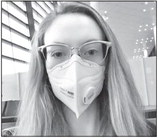Public health official says plan in place for outbreaks


By Peter Weinschenk The Record-Drivew
Public health systems are in place to respond should the coronavirus that has killed over 3,000 people, mostly in mainland China, become a pandemic that threatens Central Wisconsin, according to Joan Theuer, Marathon County health officer. “People should have confidence our public health system is prepared to deal with an outbreak,” she said. Theuer said the Wisconsin Department of Health Services, which is in close contact with the federal Center for Disease Control, would be the lead agency to handle any cases of coronavirus (known as COVID-19). A 12-county emergency readiness coalition would also be a lead player, said the county health offi cial. This coalition, formed five years ago with representatives from hospitals, long-term care facilities, EMS and emergency management, would help coordinate a response. At the local level, Theuer herself could have critical responsibilities in a coronavirus outbreak. Under Wisconsin law, she has the power to order people, schools, businesses and whole communities to be quarantined.
“Could I do that?” Theuer said. “Yes, I could. Health officers in Wisconsin have significant powers for preventing communicable diseases. That said, let me say that we take that responsibility seriously.”
Theuer said Marathon County has many resources to battle a coronavirus outbreak. The county has Aspirus Wausau Hospital and St. Clare’s Hospital, Weston, as well as Marshfield Medical Centers.
She said the facilities offer negative pressure rooms for people with highly contagious illnesses.
“We get a couple cases of tuberculosis each year,” she said. ”We isolate these individuals in negative pressure rooms.”
Theuer said local hospitals have the ability to turn entire hospital wings into negative pressure facilities, if there is a need.
The health official said Marathon County will benefit in having hospitals that can coordinate care with other hospitals.
“The good news is that our hospitals are part of larger systems,” she said. “We don’t have independent hospitals. That does make a difference.”
Theuer said central Wisconsin would have access to a strategic stockpile of coronavirus treatment supplies, including N95 face masks, should there be an outbreak here and supplies run low.
“In theory,” she said.
There are six types of coronaviruses. Several are the viruses that cause the common seasonal flu, but others, such as SARS and MERS, are acquired from animals, such as bats and camels, and are much more lethal.
The COVID-19 virus was first detected in Wuhan City, Hubei Province, China, and has spread to 70 nations, including the United States. Like the SARS virus, COVID-19 is a beta-coronavirus. It may have first been transmitted to humans at a seafood and live animal market in China.
Theuer said researchers may be able to create a vaccine that would halt the coronavirus disease but, in a worst case, it could spread and turn into another health emergency like the Spanish Flu of 1918.
She said citizens should guard against the disease in the same way that they take care not to get the flu.
“You should wash your hands, stay home from work when you are sick and cover a cough with a tissue or your elbow,” she said.
Theuer said seasonal flu illness in Marathon County has not yet peaked for the year. She declines to predict whether COVID-19 will find its way to the county, just these other flu viruses have.
“We’ll know when we know,” she said.
Area native recounts life under Chinese quarantine
A town of Stettin native who returned Feb. 1 from China said it will be harder for the coronavirus to spread in the United States, where people generally live in their own houses and don’t confront huge crowds daily. But, if it does, she said to expect businesses, especially small ones, to be severely impacted.
Calla Buttke said she and her Chinese husband Jianghan “Nick” Chen were subjected to several weeks of quarantine for coronavirus in their high rise apartment in Henan Province, 200 miles north of Hubei Province, home to the City of Wuhan, which has suffered a major coronavirus outbreak.
Buttke said Henan police and private security guards have enforced a strict mass quarantine, stopping people from going to work, grocery stores or malls. People must wear masks, she said, and be subject to offi cials using a laser pointer to take people’s temperature. People with a temperature over 102 degrees can be hospitalized.
All of these measures seem to be effective in fighting the disease.
“There were a lot of strict rules, but it seems to be working,” she said.
Buttke, who runs a business with her husband that helps Chinese students attend American universities, said commerce in China has ground to a halt.
“Totally everything was closed,” she said. “It was crazy.”
Buttke said the province-wide quarantine has been a hardship on businesses and some have not been able to survive.
“A lot of businesses have bit the dust, a lot of small ones,” she said.
Buttke said she and her husband found themselves in a situation where a business renter they had could not pay the rent because of the quarantine.
Buttke, who never contracted the virus, said sometimes the Chinese government crackdown on movement seemed severe, but, on the other hand, all Chinese have access to health care through universal insurance. She said the great mass of Chinese live in high rise apartments and frequently go to malls and restaurants to socialize. Chinese life is generally crowded and congested. The conditions are ripe for a disease to spread human to human.
Life in the United States is spread out, she said, and it could prove harder for coronavirus to spread here.
“The lifestyle in central Wisconsin is very different,” she said. “People live in their own homes and they are not constantly together in crowded areas.”


